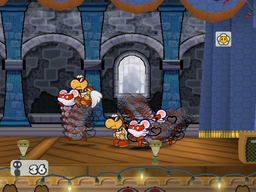Tease: Difference between revisions
Technetium (talk | contribs) No edit summary Tag: Mobile edit |
Tag: Mobile edit |
||
| Line 15: | Line 15: | ||
==Gallery== | ==Gallery== | ||
<gallery> | <gallery> | ||
Tease | PMTTYDNS Tease.jpg|Ms. Mowz using Tease in the [[Paper Mario: The Thousand-Year Door (Nintendo Switch)|Nintendo Switch remake]] of ''Paper Mario: The Thousand-Year Door'' | ||
Tease PMTTYDNS.png|Move preview for Tease in the remake | |||
</gallery> | </gallery> | ||
Revision as of 11:38, July 5, 2024
| Paper Mario: The Thousand-Year Door move | |
|---|---|
| Tease | |

| |
| Mastered by | Ms. Mowz |
| Rank | Super Rank |
| FP cost | 3 |
| Effect | Ms. Mowz attempts to daze all enemies |
| Target | All enemies |
| Action Command Tier | NICE |
Tease is a move that can be performed by Ms. Mowz in Paper Mario: The Thousand-Year Door at the cost 3 FP upon reaching Super Rank. It involves Ms. Mowz and three clones of herself jumping around, attempting to dizzy the enemies based on the individual enemies' resistance and the Action Command success. To execute the Action Command the player must hold ![]() to fill an on-screen gauge as much as possible within a time limit, without overfilling it; if overfilled, the player will lose control over the gauge and it will gradually empty. When the time ends, if the gauge is filled past two thirds then the odds of inflicting the dizzy status on each enemy will be equal to the enemy's base susceptibility; if the gauge is filled for less than two thirds, the chance of inflicting dizziness will be decreased.
to fill an on-screen gauge as much as possible within a time limit, without overfilling it; if overfilled, the player will lose control over the gauge and it will gradually empty. When the time ends, if the gauge is filled past two thirds then the odds of inflicting the dizzy status on each enemy will be equal to the enemy's base susceptibility; if the gauge is filled for less than two thirds, the chance of inflicting dizziness will be decreased.
The player can input ![]() as Ms. Mowz lands a backflip after finishing the move to perform a Stylish move. The stylish has an increased Star Power modifier in the Japanese version.
as Ms. Mowz lands a backflip after finishing the move to perform a Stylish move. The stylish has an increased Star Power modifier in the Japanese version.
Gallery
Ms. Mowz using Tease in the Nintendo Switch remake of Paper Mario: The Thousand-Year Door
Names in other languages
| Language | Name | Meaning | Notes |
|---|---|---|---|
| Japanese | まどわせ~る[?] Madowase~ru |
From「まどわせる」(madowaseru, "to trick"). The symbol ~ denotes a playful attitude. | |
| French | Chassé croisé[?] | Lit. "Comings and goings". An expression usually used to describe a situation of two people looking for each other without meeting. | |
| German | Schwindling[?] | From Schwindlig ("dizzy") and the diminutive suffix -ling | |
| Italian | SqUiTsQUit[?] | "Squeak Squeak" written in alternate caps to indicate dizziness | |
| Spanish (NOE) | Confusión[?] | Confusion |

